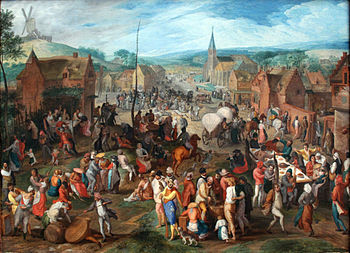
Back بوابة:الاقتصاد Arabic Portal:Ekonomija BS Portal:Economia Catalan دەروازە:ئابووری CKB Portál:Ekonomie Czech Portal:Wirtschaft German Πύλη:Οικονομία Greek Portal:Economía Spanish Portaal:Majandus Estonian درگاه:اقتصاد Persian
The Business and Economics Portal Business is the practice of making one's living or making money by producing or buying and selling products (such as goods and services). It is also "any activity or enterprise entered into for profit." A business entity is not necessarily separate from the owner and the creditors can hold the owner liable for debts the business has acquired. The taxation system for businesses is different from that of the corporates. A business structure does not allow for corporate tax rates. The proprietor is personally taxed on all income from the business. A distinction is made in law and public offices between the term business and a company such as a corporation or cooperative. Colloquially, the terms are used interchangeably. (Full article...) Economics (/ˌɛkəˈnɒmɪks, ˌiːkə-/) is a social science that studies the production, distribution, and consumption of goods and services. Economics focuses on the behaviour and interactions of economic agents and how economies work. Microeconomics analyses what's viewed as basic elements in the economy, including individual agents and markets, their interactions, and the outcomes of interactions. Individual agents may include, for example, households, firms, buyers, and sellers. Macroeconomics analyses the economy as a system where production, distribution, consumption, savings, and investment expenditure interact, and factors affecting it: factors of production, such as labour, capital, land, and enterprise, inflation, economic growth, and public policies that have impact on these elements. (Full article...) Selected articleTulip mania or tulipomania (Dutch names include: tulpenmanie, tulpomanie, tulpenwoede, tulpengekte and bollengekte) was a period in the Dutch Golden Age during which contract prices for bulbs of the recently introduced tulip reached extraordinarily high levels and then suddenly collapsed. At the peak of tulip mania, in March 1637, some single tulip bulbs sold for more than 10 times the annual income of a skilled craftsman. It is generally considered the first recorded speculative bubble (or economic bubble), although some researchers have noted that the Kipper- und Wipperzeit episode in 1619–22, a Europe-wide chain of debasement of the metal content of coins to fund warfare, featured mania-like similarities to a bubble. The term "tulip mania" is now often used metaphorically to refer to any large economic bubble (when asset prices deviate from intrinsic values). Selected image
Selected economy The economy of Sweden is a highly developed export-oriented economy, aided by timber, hydropower, and iron ore. These constitute the resource base of an economy oriented toward foreign trade. The main industries include motor vehicles, telecommunications, pharmaceuticals, industrial machines, precision equipment, chemical goods, home goods and appliances, forestry, iron, and steel. Traditionally, Sweden relied on a modern agricultural economy that employed over half the domestic workforce. Today Sweden further develops engineering, mine, steel, and pulp industries, which are competitive internationally, as evidenced by companies such as Ericsson, ASEA/ABB, SKF, Alfa Laval, AGA, and Dyno Nobel. Sweden is a competitive open mixed economy. The vast majority of Swedish enterprises are privately owned and market-oriented. There is also a strong welfare state, with public-sector spending accounting up to three-fifths of GDP. In 2014, the percent of national wealth owned by the government was 24%. (Full article...) Selected quoteHeroism and the respect it commands is a form of compensation by society for those who take risks for others. And entrepreneurship is a risky and heroic activity, necessary for growth or even the mere survival of the economy. It is also necessarily collective on epistemological grounds-to facilitate the development of expertise. Someone who did not find something is providing others with knowledge, the best knowledge, that of absence (what does not work)-yet he gets little or no credit for it. He is a central part of the process with incentives going to others and, what is worse, gets no respect. I am an ingrate toward the man whose overconfidence caused him to open a restaurant and fail, enjoying my nice meal while he is probably eating canned tuna. In order to progress, modern society should be treating ruined entrepreneurs in the same way we honor dead soldiers, perhaps not with as much honor, but using exactly the same logic (the entrepreneur is still alive, thought perhaps morally broken and socially stigmatized, particularly if he lives in Japan.) For there is no such thing as a failed soldier, dead or alive (unless he acted in a cowardly manner)-likewise, there is no such thing as a failed entrepreneur or failed scientific researcher, any more than there is a successful babbler, philosophaster, commentator, consultant, lobbyist, or business school professor who does not take personals risks. (Sorry.) Psychologists label "overconfidence" a disease, blinding people to the odds of success when engaging in ventures. But there is a difference between benign, heroic type of risk taking that is beneficial to others, in the antifragile case and the nastier modern type related to negative Black Swans, such as the overconfidence of "scientists" computing the risks of harm from the Fukushima reactor. In the case of the former, what they call overconfidence is a good thing, not something to medicate.
TopicsRelated WikiProjectsDid you know (auto-generated) -
On this day in business history
General imagesThe following are images from various business-related articles on Wikipedia.
More did you know
Business news Wikinews Economy and business portal
|
© MMXXIII Rich X Search. We shall prevail. All rights reserved. Rich X Search





































